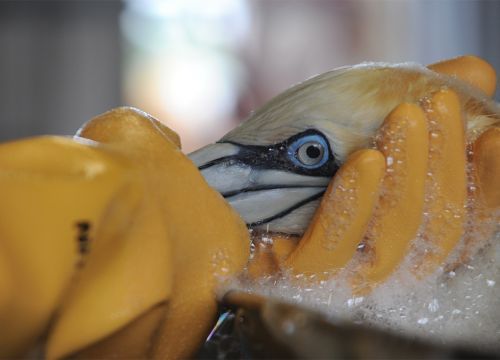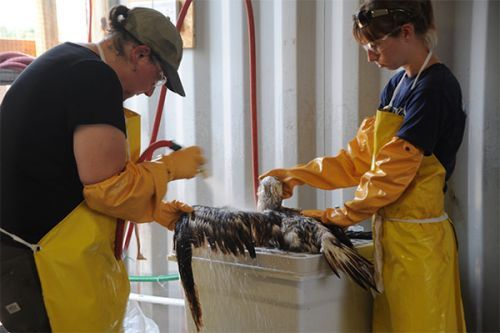Rescuing Oiled Birds, Leave it to the Experts
By Allison O’Brien, Department of the Interior
Feb. 15, 2017 - Birds, especially those that spend most of their time on the water, are vulnerable to the effects of oiling. Oil can clog feathers and cause them to mat, separate, or lose their natural waterproofing. Birds coated with oil may not be able to fly, may get sick from accidentally ingesting oil while trying to clean their feathers, or may drown from reduced buoyancy. Many people love birds, and it’s normal to want to help during an oil spill – especially when you’re seeing photos of impacted birds on the news – but it’s a myth that just a bit of dish soap can restore an oiled bird to health. So, before you hit the beach with your scrub brush and your handy-dandy dish soap, read these answers to some frequently asked questions on how to help oiled birds.
What should I do if I see an oiled bird? If there is an established oiled wildlife reporting hotline available, then please, call it as soon as possible. If not, then call your local U.S. Fish and Wildlife Office.
The bird seemed to be in distress, wouldn’t it be faster for me and my dog to chase it down and transport it in my trunk? No - birds are wild animals. It’s important to let a trained professional with the appropriate safety gear (think safety goggles, gloves, etc.) handle bird removal. Plus, depending on the species, a permit may be needed to touch or handle it.
I’m actually less concerned with own my safety than with helping this bird. Is there a problem with the dog chase and trunk transport method? Picture this: You reach into your fridge for a snack and, when you pull out your arm, it’s covered in a gooey, smelly substance. The next thing you know, aliens chase you, grab you, and take you away in the trunk of their spaceship. How would you feel? Confused? Terrified? Exactly. Please, let a trained professional handle the bird rescue. I saw an oiled bird, but I think it’s dead.
Is it still worth calling it in? Yes, other animals may see that bird as an easy meal and become ill from eating it, so it’s important the oiled bird to be removed by trained workers.
It seems like it would be faster for me to just grab the dead, oiled bird and bring it in – can I do that? No, not only is a permit needed to handle the carcass, it is considered legal evidence and needs to be handled properly, and an appropriate chain of custody needs to be maintained.
Are there ever opportunities to volunteer to help clean birds? Yes – Under some circumstances, the response officials may issue a public service announcement to request pre-trained volunteer assistance. A bird rehabilitation center is like a hospital emergency room, so please understand that it's critical for any volunteers to have the appropriate training.
Is it true that liquid dish soap is used to clean oiled birds? Yes it is. Specifically, Dawn dish soap (not antibacterial) has been approved for use in cleaning oiled birds. Read more articles on myths and misconceptions in spill response: Debunking the Myths about Garbage Patches Clean up spilled oil at all costs? Not always Restoration: The Other Part of Spill Response
Allison O'Brien is the Department of the Interior's Regional Environmental Officer for the Pacific Northwest Region, covering Oregon, Washington, and Idaho. For more information, please visit https://www.doi.gov/oepc/regional-offices/portland.
 An official website of the United States government.
An official website of the United States government. 

